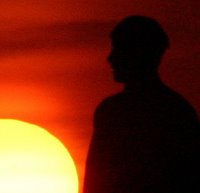Spring Turkey Hunting
On the Sunday of Memorial Day Weekend I got out of bed, walked along the edge of sleeping Craftsbury Common, sat down in a hedgerow by a corn field, and listened. A few days earlier Dave and I had seen six jakes in this field, but couldn't sneak up on them or call them into range.
It didn't take long to hear the first gobble. The turkey was down towards Sunny Sweatt's - not so far away. I called to it with my wooden Ol Yelper call, and it gobbled right back.
Before long I could hear four separate gobblers, each going off in a different direction. Sometimes it was hard to tell if they were gobbling at each other, gobbling at my calls, gobbling because the sun was coming up or gobbling because they felt horny.
The most frequent and vigorous gobbling seemed to be coming - ironically - from the meadow in front of my house, about a quarter-mile away. I waited as long as I could (though in retrospect I should have waited longer) and then headed towards the meadow through the cedar woods.
GobbleGobbleGobbleGobble. Now that I was closer to the turkey, I had a better sense of its position - in the farthest corner of my front meadow. Creeping along, I came to the edge of the field. The sun was up by now, and I was getting hot under all the camo gear. I paused, called, and the turkey gobbled back. There are small pines along the edge of the meadow, and I began crawling through them, getting closer to the turkey.
gobblegobble. That was a fainter gobble from somewhere down the Catamount Trail. GOBBLE GOBBLE GOBBLE. My turkey was really close now - only 100 yards away. I lay flat at the base of a little white pine and called. No response. Making it to another pine would get me ten feet closer. I crawled forward.
Gobble. Gobble. gobble. I still couldn't see my turkey. It wasn't far away, but seemed to have held up back in the woods. I crawled, waited, called, and waited some more. There were tiny violets and buttercups in the meadow grass. I called. I waited. I crawled forward.
I only heard the turkey gobble once more. It was well back into the woods by then, and the sun was high. I wanted a cup of coffee.
After taking over an hour to crawl across the meadow I stood up and trudged back towards the trail. I hadn't gone ten feet, though, when a turkey flushed up from the meadow grass. It had crouched down and hid when it saw me coming, and if I had taken one more step I would have stepped on its head - its bright red gobbler head - which I got a great look at as the turkey flew away and crashed into the trees.
The other gobbler, I realized. It had been following my calls, stalking me as I stalked the first turkey. If only at some point in my long and disappointing meadow crawl I had simply looked behind me.
I went home, made coffee, shed my camo coveralls, face mask, hat, and gloves, unloaded my shotgun, and got in the shower. But the hunt wasn't over. As I got out of the shower and looked out the bedroom window, what did I see but a red-headed gobbler, making his persistent way through the meadow grass.
I grabbed my rubber gobbler call, held it out the bedroom window, and gave it a shake. Gobble Gobble Gobble. The turkey stopped in its tracks, extended its neck, and gobbled back. There was no time to lose.
I scrambled downstairs stark naked, still holding the gobbler call. The church bells were ringing on the Common, just past the Craftsbury Public Library, and I paused for a moment to appreciate how awesome it is to live in the Northeast Kingdom of Vermont.
Then I realized that if I could see the church and library, people in the church and library could see me - standing naked in front of the window holding a turkey call that looks like this:
I quickly ducked into the mudroom, grabbed my shotgun, pulled on my coveralls and ran barefoot into the field. The turkey was down in the woods, gobbling. Once more I crawled to the edge of the meadow. Wilson had been told to sit and stay, but he followed me at a distance. I lay there amidst all the little flowers, listening. Wilson tentatively walked up, stretched out, and rolled in the summer sun.
Labels: Craftsbury, hunting, Memorial Day, Northeast Kingdom, outdoors, turkey hunting, Vermont, VT

.jpg)
.jpg)

.jpg)






